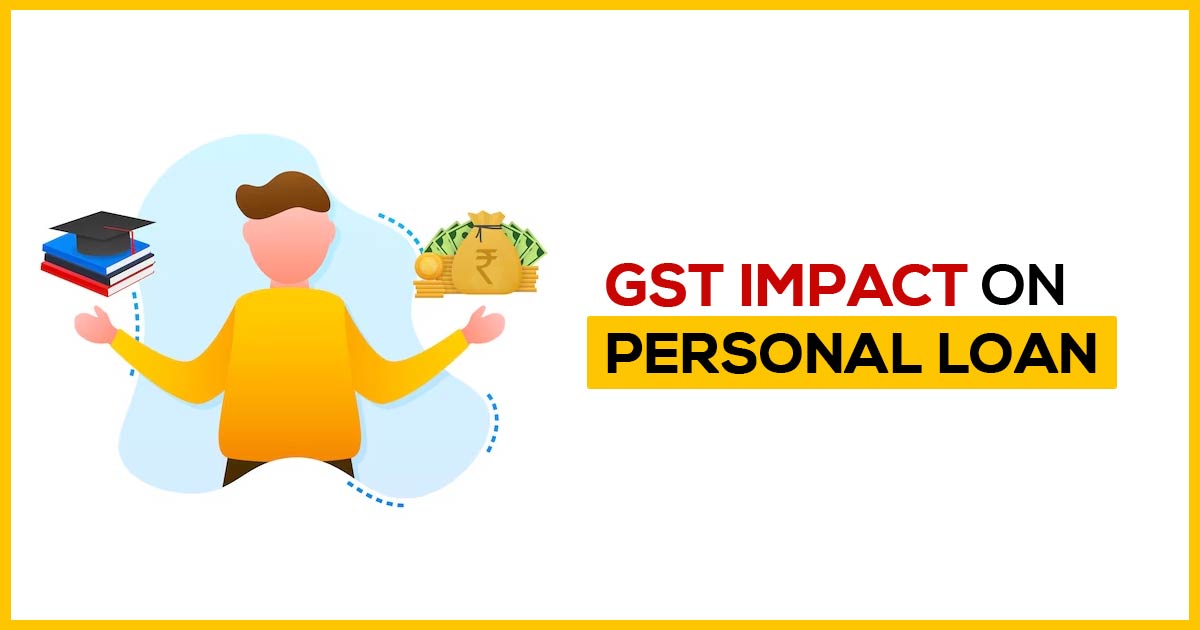
Understanding the impact of the Goods and Services Tax (GST) on personal loans can be somewhat complex. Whether you’re considering seeing a loan or repaying one, having knowledge of GST is crucial for your financial goals. familiarize yourself with how GST affects personal loans so that you can make informed decisions.
How GST Impacts Personal Loan
The implementation of Goods and Services Tax (GST) in India on July 1, 2017, had a significant impact on personal loans. Before GST, personal loans were subject to a service tax of 15%. However, with the introduction of GST, the tax rate increased by 3%, resulting in a total tax of 18%. This means that borrowers now need to consider this higher GST rate when applying for personal loans.
Despite the increased cost due to the higher GST rate, personal loans remain a widely adopted way of getting financial support when in need. They provide the advantage of accessing extra funds without the requirement for collateral. Even with the additional GST, personal loans continue to be a viable option for individuals seeking financial flexibility.
Influencing Factors on GST for Personal Loans
Several crucial factors contribute to understanding the impact of GST on personal loans. These factors not only specify the scope of the tax’s influence but also shape the overall financial outcomes for borrowers. Let’s delve into these determining factors:
- Processing Charges: The primary focus of GST is on the processing charges of personal loans. Since these charges vary among lenders, the applicable GST can differ based on the chosen financial institution and its fee structure.
- Loan Amount and Time Duration: While GST is not directly applied to the loan amount or duration, these factors indirectly affect the processing charges. Generally, higher loan amounts or longer durations may result in higher processing charges, consequently increasing the GST component.
- Regulatory Modifications: Any alterations in GST rates or regulations by the government directly impact the amount of GST levied on services connected to personal loans.
- Supplementary Fees: Other charges related to loans, such as prepayment fees, penalties for late payments, and fees for bounced cheques, also attract GST. The structure and frequency of these charges can affect the overall GST cost of a personal loan.
Advantages and Disadvantages of GST on Personal Loans
Regional variations and modifications to tax laws may affect how the Goods and Services Tax (GST) affects personal loans. Below, we have showcased some advantages and disadvantages:
Advantages of Personal Loans
- Uniformity and Openness: GST brings uniformity to the tax structure in the financial sector, improving transparency in loan processing fees.
- Simplified Tax Structure: By consolidating multiple indirect taxes into a single tax, GST streamlines the tax framework, making it smooth for borrowers to comprehend the tax limitations on their loans.
- Adherence to Regulations: GST ensures that financial institutions follow standardized tax practices, promoting a fair lending environment.
Disadvantages of Personal Loan
- Higher Starting Expenses: The application of GST on processing fees results in a slight increase in the initial cost of obtaining personal loans.
- Complexity for the Customer: Understanding the tax implications related to various charges associated with personal loans can be difficult for some borrowers.
- Effect on the Affordability of Loans: The additional GST cost on processing fees may affect the overall affordability of the loan, particularly for individuals with limited budgets.
How to Avoid GST on Personal Loan
Finding a legal way to completely avoid GST on personal loans is not possible, but you can minimize its impact. Choosing lenders with lower processing fees or negotiating the fees can help reduce the GST burden before applying for the loan.
Taxable Charges Associated with Personal Loan
Not all charges associated with personal loans are subject to GST. Key components that attract GST include:
Effect of GST on Processing Fees
When you make an application for a personal loan, the financial institution faces administrative costs, which are then transferred to you as processing charges. Since this processing is viewed as a service provided by the institution, it is subject to a GST rate of 18%.
For example, if you borrow ₹2,00,000 as a personal loan and the processing fee is 3%, the processing fee before tax would be ₹6,000. Including the 18% GST, the total processing fee you would need to pay adds up to ₹7,080.
GST Applies to Prepayment Fees
Personal loans frequently offer the advantage of allowing borrowers to make early payments, but there is a fee associated with this called the prepayment charge. As this fee is regarded as a service provided by lenders, it is subject to Goods and Services Tax (GST).
For example, if a 2% prepayment fee is imposed on a personal loan amount of ₹50,000 by your lender, the fee of the prepayment would be ₹1,000, and the total payable amount would be ₹1,180, including an 18% GST.
No GST on Interest Rates
When determining a lender, the interest rate is a crucial factor for many borrowers. It’s vital to keep in mind that GST does not apply to the interest paid on personal loans. Interest payments are part of the financial contract between the borrower and lender and are not regarded as a service.
Conclusion: Having an understanding of the implications of GST on personal loans is essential for individuals who are financially aware. While the inclusion of GST on processing fees slightly increases the initial cost, Axis Bank mitigates this with its borrower-friendly features.








